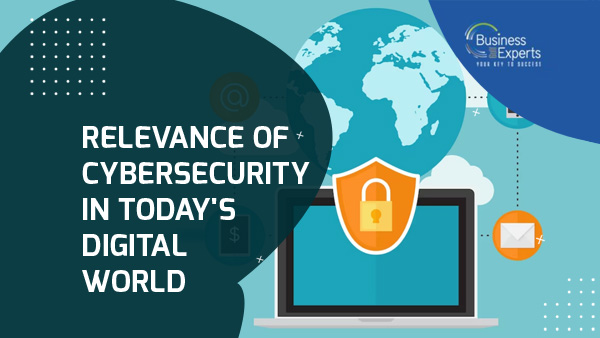Relevance of Cybersecurity in Today’s Digital World
by September 08, 2023

In today’s interconnected and technologically advanced world, the significance of cybersecurity cannot be overstated. With the proliferation of digital devices and the increasing reliance on the internet for communication, commerce, and information sharing, protecting our digital infrastructure and sensitive data has become paramount.
Importance of Cybersecurity in the Digital World
Protection against Cyber Threats
Cyber threats have evolved rapidly, becoming more sophisticated and pervasive than ever before. Malicious actors, including hackers, cybercriminals, and state-sponsored entities, constantly seek to exploit vulnerabilities in computer systems, networks, and individuals’ online activities. The consequences of successful cyber-attacks can be severe, ranging from financial losses and intellectual property theft to privacy breaches and reputational damage.
Implementing robust cybersecurity measures helps safeguard against such threats by establishing layers of defence. This includes utilizing firewalls, intrusion detection systems, encryption, and antivirus software to protect networks and systems. Regular security updates and patches help address known vulnerabilities, reducing the risk of unauthorized access and data breaches.
Protection of Sensitive Data
In our digital age, sensitive information is constantly being exchanged across various platforms. Whether it’s personal data, financial records, or proprietary business information, the security of this data is of utmost importance. Cybersecurity measures play a vital role in preserving the confidentiality, integrity, and availability of sensitive data.
Encryption techniques can be used to scramble data, making it unreadable to unauthorized individuals. Secure data storage and backup mechanisms protect against accidental loss or destruction of critical information. Additionally, strong authentication protocols, such as two-factor authentication, help ensure that only authorized individuals can access sensitive data.
Preserving Privacy and Trust
The digital revolution has resulted in an unprecedented amount of personal information being collected, stored, and shared online. Maintaining privacy and establishing trust are crucial for individuals and organizations alike. Cybersecurity practices are essential in protecting individuals’ privacy rights and preventing unauthorized surveillance or identity theft.
Adhering to privacy regulations, such as the General Data Protection Regulation (GDPR) and the California Consumer Privacy Act (CCPA), is not only legally mandated but also crucial for building trust with customers. By implementing strong security measures, organizations demonstrate their commitment to protecting the privacy of their users, fostering trust and confidence in their services.
Safeguarding Critical Infrastructure
Cybersecurity is not limited to protecting individual devices or networks; it extends to safeguarding critical infrastructure, including power grids, transportation systems, and healthcare facilities. Such infrastructure plays a fundamental role in society’s functioning, and any disruption or compromise can have dire consequences.
A robust cybersecurity framework for critical infrastructure ensures the availability, reliability, and resilience of these systems against cyber-attacks. It involves continuous monitoring, incident response plans, and the implementation of best practices to prevent potential vulnerabilities from being exploited.
Mitigating Financial Losses and Reputational Damage
Cybersecurity incidents can have severe financial implications for individuals and organizations. A successful cyber-attack can lead to financial losses through theft, fraud, or disruption of business operations. Recovery costs, including legal fees, remediation efforts, and reputational damage control, can be substantial.
Investing in cybersecurity measures can significantly reduce the risk and potential impact of such incidents. Proactive measures, such as employee training, regular vulnerability assessments, and robust incident response plans, enhance an organization’s ability to detect and respond effectively to cyber threats, mitigating financial losses and preserving reputation.
In summation, as we navigate an increasingly digitized world, prioritizing cybersecurity is not a luxury but a necessity. The importance of cybersecurity cannot be overstated, as it underpins the protection of sensitive data, preserves privacy and trust, safeguards critical infrastructure, and mitigates financial losses and reputational damage. By implementing robust cybersecurity practices, both individuals and organizations can ensure a safer and more secure digital environment for all.
To know more you can contact us at info@bemea.com. Follow us on our LinkedIn to stay up-to-date on this solution.






